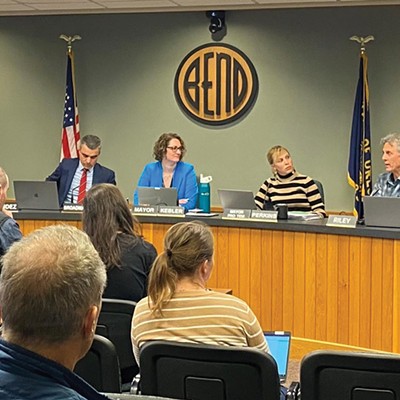We're not gonna take it. The ladies from CodePink, the national anti-war group that has been needling our elected representatives to get America out of Iraq, are stirring up trouble again. Local CodePink representatives and their supporters are planning a vigil outside the offices of Senators Ron Wyden and Gordon Smith and U.S. Rep. Greg Walden.
Earlier this year a group of local CodePink members that included mothers and grandmothers was arrested during a sit-in at Walden's Bend office in one of the more spirited displays of non-violent resistance to the war.
While there are no plans to re-occupy Walden's office, the group will ask our elected officials in D.C. to sign a pledge ending America's military campaign in Iraq in favor of a peaceful transition to a sovereign and independent government. The group said the recent push for additional troops in Iraq and Gen. Patraeus' visit to Capital Hill this week to rally support for the war spurned CodePink in action.
"This seemed like a good time to put out a statement that we're not going to be fooled again," said Kathy Paterno, a CodePink volunteer who may or may not have been channeling Roger Daltry circa 1971.
We'll show up just to see if she can pull of the greatest scream in rock history.
If not, there's still rumored to be street theatrics and other protesty stuff.
You Go, Girls.
Attendees are asked to dress in black with shenanigans starting around 11 a.m. on Friday outside the politicos local offices on Hawthorne.
Last Curtain Call
A TV interviewer once asked Luciano Pavarotti if it was true that operatic tenors get as many women as rock stars. "If it is true, I feel sorry for the rock stars," Pavarotti quipped.
Although he might not have had as many nubile groupies fluttering around him as Mick Jagger or Axl Rose, Pavarotti was a rock star in his own right. For more than 30 years, from his 1972 New York Metropolitan Opera debut in Donizetti's La Fille du Regiment, when he drove the audience wild and received a record 17 curtain calls, until his retirement for health reasons in 2005 he was inarguably the world's most famous and popular opera performer.
Whether he was the best operatic tenor of his era always has been, and probably always will be, disputed. Critics said his acting was mediocre and hammy.
The public couldn't care less. The power and clarity of Pavarotti's voice combined with his larger-than-life personality and showmanship broughth him more notoriety and admiration than any tenor since Enrico Caruso.
Pavarotti's 1990 single of "Nessun dorma" from Puccini's Turandot - the aria that became his signature - rose to Number 2 on the pop charts in Great Britain, the only opera recording ever to reach that height. He sold more than 100 million records. He was the first opera star to play Madison Square Garden. He played Vegas. He sang on Saturday Night Live. You can download snatches of his arias as ringtones.
Opera purists scoffed at Pavarotti for being commercial. But purists overlook that in its heyday opera was a very commercial - and widely popular - entertainment form. As David Hadju wrote in the New York Times, Pavarotti "came to see his work as a mission of outreach. In this, he was carrying on a tradition as old as opera itself."
After struggling for over a year with pancreatic cancer, Luciano Pavarotti died last Thursday at the age of 71. Italian Premier Romano Prodi and former UN Secretary General Kofi Annan attended his funeral Saturday. So did U2's Bono. Pavarotti would have liked that.
It's Hot, It's Buttery, It's Deadly
Butter-flavored microwave popcorn, in moderation, probably won't hurt you. But eating two bags a day and huffing the fumes might not be such a great idea.
The New York Times reported last week on the case of a 53-year-old Colorado furniture salesman who apparently contracted a rare - and potentially fatal - lung disease because of his popcorn addiction.
The victim, who was not named, developed a breathing problem that doctors couldn't diagnose. Luckily for him he ended up in the office of Dr. Cecile Rose, director of occupational disease clinical programs at National Jewish Medical and Research Center in Denver.
Rose was familiar with "popcorn worker's lung," a disorder that afflicts workers in popcorn factories. The culprit isn't the popcorn itself but dicetyl, a chemical used to give microwave popcorn its "buttery" flavor.
The salesman's symptoms and some of his lab results suggested popcorn worker's lung, so Rose asked him if he spent much time around popcorn. "His jaw dropped and he said, 'How could you possibly know that about me? I am Mr. Popcorn. I love popcorn,'" Rose told the Times. The salesman said he had been eating microwave popcorn at least twice a day for more than 10 years.
"When he broke open the bags, after the steam came out, he would often inhale the fragrance because he liked it so much," Rose said. "That's heated diacetyl, which we know from the workers' studies is the highest risk."
Rose immediately told her patient to lay off the popcorn. He wasn't happy about it, but he complied. Six months later his lung function has improved and - probably not surprisingly - he's lost 50 pounds.
The U.S. Food and Drug Administration is reviewing the safety of dicetyl in light of this case and other findings. A spokesperson for ConAgra Foods, the leading manufacturer of microwave popcorn, said the company plans to remove diacetyl from its microwave popcorn products.
Meanwhile, Upfront is going to get our old 1970s-era hot-air popcorn popper out of the closet.
The Dark Ages Had Their Gay Side
Think gay marriage is a decadent invention of the 21st century? Think again. A historian says he's uncovered evidence that homosexual unions existed - and were officially sanctioned - way back in the Middle Ages.
"Western family structures have been much more varied than many people today seem to realize," Allan Tulchin of Shippensburg University in Pennsylvania wrote in the September issue of the Journal of Modern History. "And Western legal systems have in the past made provisions for a variety of household structures."
As evidence, Tulchin points to medieval legal contracts that used the term affrèrement, translated as "brotherment." The people who agreed to such contracts pledged to live together sharing un pain, un vin, et une bourse - French for "one bread, one wine and one purse" - meaning all their property was held in common.
Such contracts could be entered into by relatives, Tulchin said - for example, two or more brothers who agreed to share their parents' estate. But they also sometimes involved two unrelated men.
"I suspect that some of these relationships were sexual, while others may not have been," Tulchin told the website LiveScience. "It is impossible to prove either way, and probably also somewhat irrelevant to understanding their way of thinking. They loved each other, and the community accepted that."























